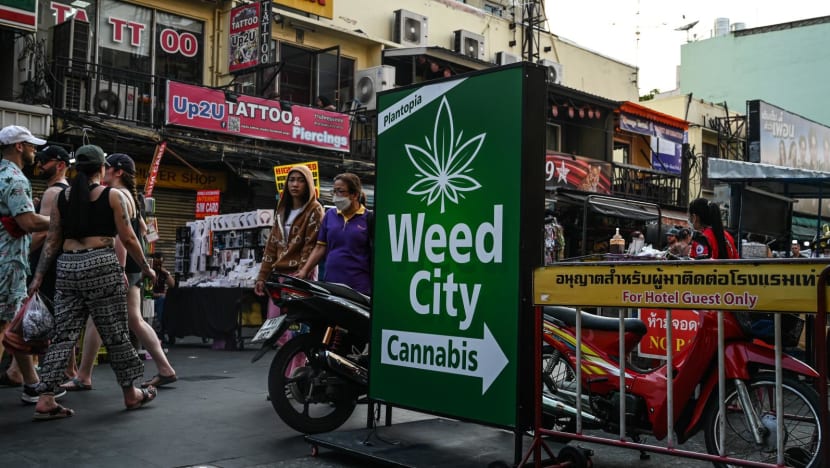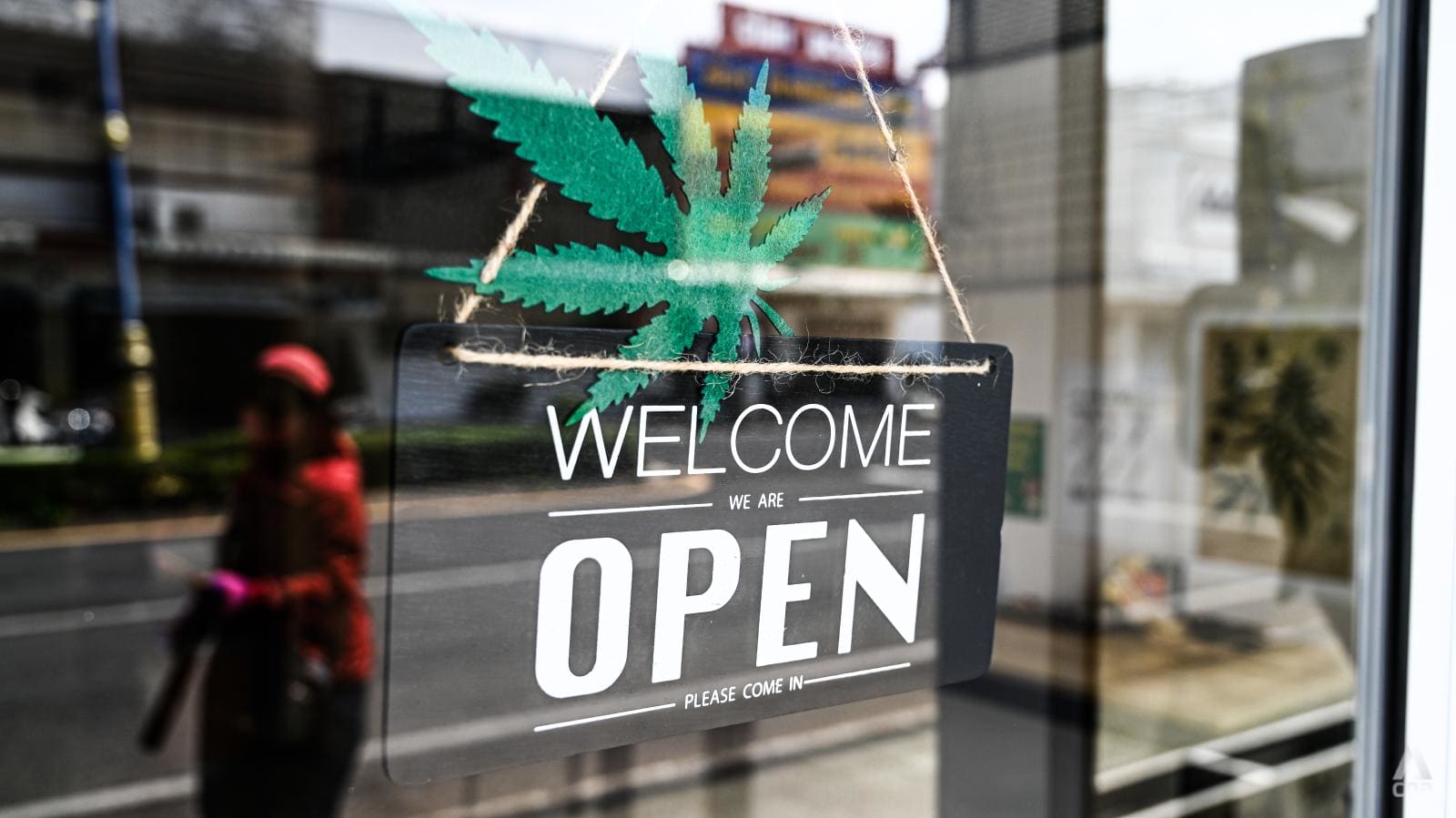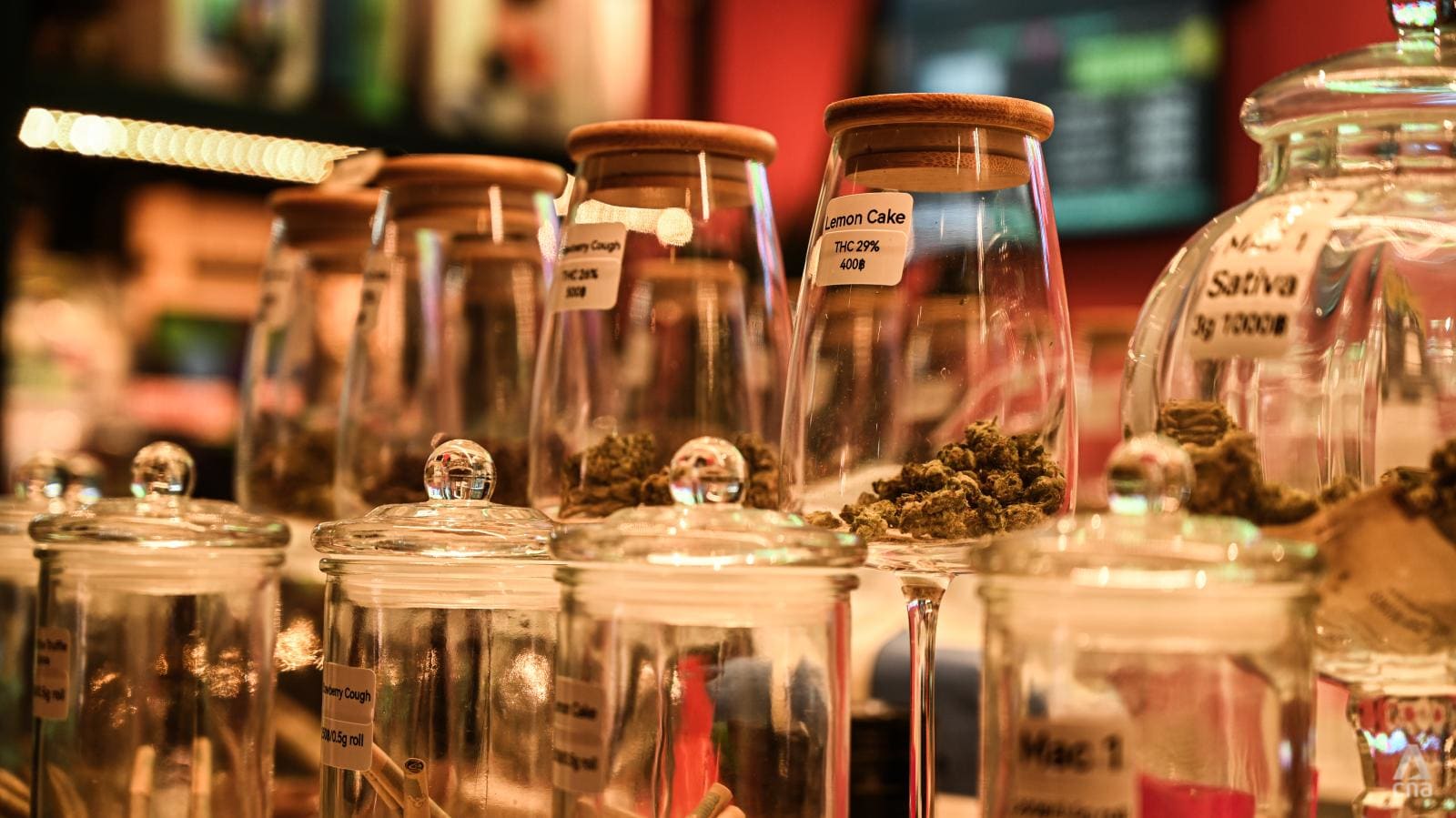‘A rubber band snapping back’: Thailand’s cannabis U-turn a return to political middle-ground, say observers
Prime Minister Srettha Thavisin’s May 7 announcement of plans to put cannabis back on the narcotics list has faced opposition from businesses and even members of his ruling government, though some welcome the prospect of safeguards against foreign players.

Bangkok's Khaosan Road is a busy place for tourists and cannabis business. (Photo: Jack Board/CNA)

This audio is generated by an AI tool.
BANGKOK: A need to regulate the cannabis sector against an influx of foreign investors and a desire to score with conservative voters are reasons fuelling the Thai government’s plans to U-turn against its decriminalisation of the drug, say observers.
But they add that risks lurk for Prime Minister Srettha Thavisin, with various factions in his coalition government adopting different stances on the issue, and pro-cannabis groups already threatening to hold protests against his promise to add the drug back to the country's narcotics list by this year-end.
For nearly two years, the country has witnessed the runaway expansion of the cannabis industry after becoming the first country in Southeast Asia to decriminalise the drug in 2022, setting Thailand on the path towards a recreational cannabis high.
But after campaigning for harsher restrictions on drug use during Thailand's election last year, Mr Srettha on May 7 reaffirmed his intention to ban its recreational use by the end of the year.
"I want the health ministry to amend the rules and re-list cannabis as a narcotic," Mr Srettha said on social media platform X.
"The ministry should quickly issue a rule to allow its usage for health and medical purposes only."
Mr Srettha also gave a 90-day deadline for law enforcement and local authorities to crack down on drugs in 25 provinces considered “red zones.”
The move could have a drastic economic impact on the industry, which was expected to be worth up to US$1.2 billion by 2025 but now faces a period of prolonged uncertainty.
Rising feelings of anger in the business community stem from the government attempting to reverse course, despite many entrepreneurs following the law and making major investments accordingly over the past two years.
If cannabis was classified as a class five narcotic, it would be illegal to possess or consume it, though cannabis for health and medical purposes will still be permitted.
Such action could devastate vast numbers of local businesses, according to Mr Rattapon Sanrak, the founder of cannabis dispensary and eatery Highland Cafe and a longtime advocate for the domestic cannabis industry.
“The impact and the consequences of what he wants to do will be huge and disastrous. We have a few plans right now. We'll be going to protest for sure,” he said.
“And now, the government's going to put them into jail? Now, they’re going to point in those people's faces and tell them they’re criminals?
“People are really upset. They have to protect their rights, because they have done nothing wrong,” he said.
Advocacy group Writing Thailand’s Cannabis Future, has claimed it will hold a protest against the move in Bangkok on May 16, according to local media.

POLITICAL POSTURING
Draft bills on cannabis have been circulating for months but there remains a lack of clarity or detail about how the Pheu Thai-led government will enact changes to the law.
The Ministry of Public Health has said more consultation needs to be done before a final bill is decided by cabinet and then proposed to parliament. Finer details will be determined by the Narcotics Control Board, Mr Srettha said, a committee he chairs.
But like in the community, cannabis is a divisive topic within the ruling coalition government itself - one of Pheu Thai’s partners, Bhumjaithai was largely responsible for ushering in the legalised cannabis era.
Former health minister, Bhumjaithai leader and deputy prime minister Anutin Charnvirakul removed cannabis from his ministry's list of controlled drugs in 2022 and he has been vocal in the past week about a proper and formal review being done before any restrictions are re-enforced.
Delicate negotiations would have been ongoing within the ruling coalition about what the restrictions should actually be and to ensure the government does not fracture over the issue, according to Dr Yuttaporn Issarachai, a political scientist from Sukhothai Thammathirat Open University.
“I believe the relationship with Bhumjaithai is crucial here and that a certain level of talks must have already taken place before.”
“Despite the push to re-criminalise cannabis, I don’t think Bhumjaithai will be so affected that it would leave the coalition. We can’t forget that although the cannabis policy is from Bhumjaithai, particularly when Mr Anuthin was the health minister, the re-criminalisation is wanted by quite a lot of people,” he said.
Mr Srettha recently reshuffled his cabinet to position more strategic names into pivotal portfolio positions, moves that could help him push through his party’s political agenda.
The government has faced major policy headwinds in recent months, unable to yet make good on key election promises, including its digital wallet, a plan to stimulate the economy through a cash handout scheme.
Other populist policies like reducing electricity prices, suspending debts for farmers, and raising the minimum wage have also hit obstacles.
Cannabis is shaping up as an area for Mr Srettha to gain momentum, and win favour with conservative wings of the electorate.
“It’s (about) the ethics of average Thai voters," said Associate Professor Paul Chambers from the Center of ASEAN Community Studies at Naresuan University, adding that community fears about the social impacts and damage from marijuana use have spiked as usage has grown.
Statistics point to cannabis use spiking over the past two years - among young people it is 10 times higher than before legalisation, according to the Center of Addiction Studies at Chulalongkorn University. Cannabis users in 2022 reached 11.1 million, the centre found.
Professor Paisan Limstit, a critic of the decriminalisation of cannabis, from the Health Laws and Ethics Center at Thammasat University, welcomed the prime minister’s firm stance.
He has previously lamented the social impacts of the decriminalisation of cannabis and said that the number of drug users has skyrocketed along with associated crimes and reputational damage to the country’s tourism sector.
“It is a good thing that the government should do. But there is still uncertainty in the matter of details,” he said.
There are likely to be influential economic factors for the government to consider as well. Taxing cannabis would provide huge windfalls to the government’s coffers.
For Assoc Prof Chambers, those economic benefits for a national economy still recovering from COVID-19 could be hard to resist, thus making cannabis unlikely to be eradicated completely.
“Mr Srettha is trying to follow through on Pheu Thai’s election campaign promises to get tough on the sale and consumption of marijuana. At the same time, he understands that marijuana is a commodity which might be good for the Thai economy,” he said.
“Profits will win out. One way or another, marijuana as a commodity will remain accessible to people in Thailand, perhaps just a little pricier. That’s all.”

A RUBBER BAND SNAPPING BACK
Despite the uproar from business groups, medical cannabis operators are more circumspect about the need for proper handrails on what is now a mostly unregulated industry.
Foreigners investing in the sector - which is meant to be illegal - has become widespread and problematic, according to Mr Suphamet Hetrakul, co-founder of Teera Group, a company focused on researching and cultivating herbs for medical purposes.
“Many (dispensaries) are actually owned by non-Thais who discriminate against Thai cannabis cultivators, not to mention illegally smuggling cannabis into Thailand which is another very simple and very clear rule being violated,” he said.
“While it is not ideal for cannabis to be back on the narcotics list, we welcome any attempt to control and regulate the primordial chaos that is the current ‘laws are more like guidelines’ cannabis market.”
Local operators have regularly complained about an oversupply of cannabis in the market driven by foreign players, causing prices to drop and impacting farmers.
Mr Anutin - now Thailand’s interior minister - threatened last week to arrest any foreigners operating cannabis dispensaries.
Gaining a licence to open a dispensary is now as simple as filling out an online form, Mr Suphamet said. As a result, unsafe, unhealthy and unregulated cannabis products are being sold to customers all over the country.
“This is a recipe for a public health disaster,” he said, calling for rigorous tracking and testing requirements for the drug.
Mr Noah Levit Ades, the director of cannabis operations at Thonburi Healthcare Group, the country’s first cannabis facility to be built by a hospital for its own use and research, agreed that Thailand could benefit greatly from building a more serious industry with rules and restrictions.
Right now, the country is “flooded” with people from around the world “doing whatever they want” and providing few benefits, he said.
While he lamented that some small operators would likely lose out, the opportunity for the country to be at the forefront of medical cannabis research and products should be prioritised.
“I think it'll be able to employ a lot of Thai people and do great things to the economy once they can figure out how to tax it. And not only that, it'll also be great for Thailand to be on the world stage as a leader at the forefront of cannabis cultivation and medical cannabis,” he said.
“It sounds sort of like a rubber band effect. It went way too far one way. So it's snapping back and I think we'll end up in a pretty decent middle ground.”














